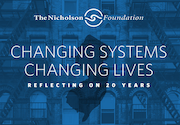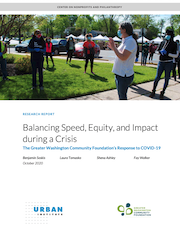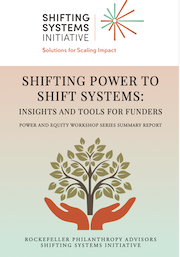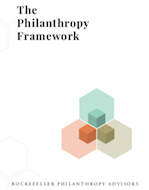Site Search
- resource provided by the Forum Network Knowledgebase.
Search Tip: Search with " " to find exact matches.

For 20 years, The Nicholson Foundation worked to advance meaningful change in safety net service systems in New Jersey. Its grantmaking journey is described in Changing Systems, Changing Lives: Reflecting on 20 Years. Through stories and related text, the book showed how a small family foundation could take six guiding themes and put them into action through grants and partner support. In the process, the Foundation collaborated to spur real systems change that benefitted individuals, families, and communities. A recent scholarly paper built on that work, helping to make the Foundation’s approach broadly accessible to researchers, academics, and philanthropists. “A Framework for Creating Systems Change,” by Drs. William Brown and Wynn Rosser published in The Foundation Review, presents a new model for systems change. Five of the model’s seven components reflect themes in Changing Systems, Changing Lives. The sixth component slightly shifts the emphasis of the Foundation’s “Engaging with Government” theme, and the seventh highlights the Foundation’s overall approach by including performance measurement as a distinct and separate component of the model.
Download or order a free hard copy of The Nicholson Foundation book, "Changing Systems, Changing Lives"
Read Brown W, Rosser W. "A Framework for Creating Systems Change". The Foundation Review, 2023;15(4):50-6.
The Health and Environmental Funders Network (HEFN) and Sustainable Agriculture and Food Systems Funders (SAFSF) invite you to join an informal conversation to learn from funder peers who are practicing participatory grantmaking (PG). We’ll begin with a brief overview of PG, and how this practice can be used to center equity and justice as we shift away from extractive grantmaking practices. We’ll then hear from a few HEFN and SAFSF members who are implementing different models of PG in their grantmaking.
If you’re new to the concept of participatory grantmaking, this webinar is a great opportunity to see examples of it in action. If you’re familiar with participatory grantmaking (or working to implement these practices in your own world), this is a chance to dive deeper into others’ practices for learnings and insight. Time will be reserved in the agenda for discussions in smaller groups and, as you might expect, the call will be participatory!
Speakers:
Amanda Tello, St. Louis Environmental Justice Fund
Shavaun Evans, Food and Farm Communications Fund
Mark Muller, Regenerative Agriculture Foundation
Resources
Zoom Recording
Webinar slides
Deciding Together Shifting Power and Resources Through Participatory Grantmaking
Amanda Tello’s communal agreements
PG Learning Community Summary
This year, GivingTuesday, a global generosity movement, is Tuesday, November 28. While this annual traditional is best known for highlighting charitable organizations’ missions and elevating individual giving, how can corporate philanthropy leverage these types of giving days and partnerships to engage in and promote greater impact? We’ll hear from Woodrow Rosenbaum, Chief Data Officer, GivingTuesday, who will share the history and evolution of this special day, as well as giving trends from a national perspective.
As Chief Data Officer, Rosenbaum has been instrumental in shaping the global generosity movement and has spearheaded ground-breaking research and analysis of individual giving behaviors. He leads the GivingTuesday Data Commons, bringing together a coalition of more than 300 collaborators coordinated through eight working groups as well as data teams in 50 countries to understand the drivers and impacts of generosity to inspire more giving of all types. Woodrow brings expertise in moving markets and transforming audiences from passive participants to active and vocal ambassadors. He is founder and CEO of With Intent, an international consumer marketing agency, a member of the Generosity Commission Research Task Force, serves as board chair for Global Impact Canada, and is a Fellow at the Belfer Center for Science and International Affairs at Harvard Kennedy School.
Following the presentation and Q & A, we’ll have dedicated time for corporate funders to hear from one another, share programs and projects, and learn from one another. We encourage every attendee to participate in this discussion.
Webinar Video
The Morris County Funders Group, a coalition of 10 grantmaking organizations, pooled $325,000 to support mental health in the region. With funding from this newly formed collaboration, the Mental Health Association in New Jersey (MHANJ) will facilitate mental health first aid training for up to 45 Morris County organizations. This first initiative of the funders group aims to address the growing mental health crisis in young people and adults.
Supporters of this initiative include the Community Foundation of New Jersey, Geraldine R. Dodge Foundation, The Hyde and Watson Foundation, Somerset Hills Community Health Foundation, Fannie E. Rippel Foundation, Blanche and Irving Laurie Foundation, Six Talents Foundation, F. M. Kirby Foundation, MCJ Amelior Foundation, and the Mimi Washington Starrett Foundation.
Moderated by Justin Kiczek, F. M. Kirby Foundation, you’ll hear from panelists Bernie Moriarty, Hyde & Watson Foundation and Aaron Turner, Community Foundation of New Jersey, Bob Kley from MHANJ and a partner nonprofit. The panel will share how the funders came together to support this important and urgent issue, and how they worked in collaboration with MHANJ. Following the panel discussion, participants will have time for Q & A.
Webinar Video
Resources
Mental Health Association in New Jersey
Jersey Gives a Damn Podcast
In predominantly renter-based markets across the Northeast, housing-related financial strain remains a significant barrier to household stability and long-term economic security. Yet innovative models are emerging that seek to flip that script, creating pathways for renters to build assets, reduce risk, and participate more fully in local prosperity.
Building on the momentum from AFN’s September 2024 webinar exploring regional strategies to increase affordability, reduce evictions, and deliver financial return or dividends to renters, this session will take a deeper dive into renter wealth-building models in action.
Join AFN, partners in New Jersey, and collaborators from national nonprofits and financial institutions as we explore promising approaches that leverage public-private tools, housing finance innovation, and credit-building strategies tied to rent payment. We’ll examine how these approaches can expand renter access to economic opportunity and help funders consider how to adapt similar efforts in urban centers across the region.
Speakers:
Rachel Levy-Culler, Housing Innovations Senior Specialist, Credit Builders Alliance (CBA)
Marcus Randolph, President & CEO, Invest Newark
Khaatim Sherrer El, Executive Director, Clinton Hill Community Action
Marco Villegas, Program Officer, JPMorgan Chase
Who Should Attend:
Philanthropic leaders, community investors, housing advocates, and public-private partners working to advance financial security and equity for renters. This webinar is open to all and will focus on the New Jersey and Northeast AFN regions.
Captioning will be provided. If you have any other accessibility requests or questions, please email Paula Dworek. Requests for reasonable accommodations must be received by May 5, 2025, to ensure our ability to meet your request.
This weekly conference call series welcomed New Jersey-based grantmakers along with national funders and provided an opportunity for grantmakers to hear from a wide range of experts in the field of disaster philanthropy. This series started on November 5, 2012, one week after Sandy struck New Jersey, and continued through March 25, 2013. The audio files of each recording are listed below.
Update from The President's Hurricane Sandy Rebuilding Task Force (3/25/13)
Environmental Justice Issues (3/18/13)
Update from the Governor's Office of Recovery and Rebuilding & Universal Design (3/11/13)
Governor & Mrs. Christie's Hurricane Sandy NJ Relief Fund & Report on Ocean/Monmouth Tour (3/4/13)
Christopher Kaufman Ilstrup, Vermont Community Foundation (2/25/13)
NJ Recovery Fund and Post Sandy Environmental Issues and Challenges (2/11/13)
Housing Issues Related to Natural Disasters and Post Hurricane Sandy (2/4/13)
FEMA's Long Term Recovery and Capacity Building Team (1/28/13)
Reports from NJ's Long Term Recovery Groups and Environmental Leaders Meeting (1/14/13)
Stewart Sarkozy-Banoczy, Director of the Office of International & Philanthropic Innovation (1/7/13)
Dr. April Naturale - Mental Health Issues Resulting from Disasters (12/17/12)
Peter Kasabach, Executive Director of New Jersey Future (12/10/12)
Byron Mason of the Federal Department of Health and Human Services (12/3/12)
John Grady Davies, President of Baton Rouge Area Foundation (11/26/12)
Cathy McCann, President of NJ Voluntary Organizations Active in Disasters (11/19/12)
Jera Stribling, Executive Director of Bruno Foundation and FEMA (11/12/12)
FEMA - Long Term Recovery Office (11/5/12)
- attribute the materials to the Council of New Jersey Grantmakers
- affix references to the Council of New Jersey Grantmakers on all reproductions
- make no changes to the materials
- refrain from any redistribution of the materials
- Uploading, posting, emailing, transmitting or otherwise making available any content that is unlawful, harmful, threatening, abusive, libelous, or obscene;
- Impersonating any person or entity, or falsely stating or otherwise misrepresenting your affiliation with a person or entity;
- Forging headers or otherwise manipulating identifiers in a manner that disguises the origin of any content you transmit in any manner through this Web site;
- Uploading, posting, emailing, transmitting or otherwise making available any content that you do not have a right to make available under any law or under any contractual or fiduciary relationship (such as inside information, proprietary and confidential information learned or disclosed as part of employment relationships or under nondisclosure agreements);
- Uploading, posting, emailing, transmitting or otherwise making available any content that infringes any patent, trademark, trade secret, copyright or other proprietary right of any party;
- Uploading, posting, emailing, transmitting or otherwise making available any unsolicited or unauthorized advertising, promotional materials, or any other form of solicitation, without the Forum’s prior written approval;
- Uploading, posting, emailing, transmitting or otherwise making available any content or material that contains software viruses, worms or any other computer code, files or programs designed to interrupt, destroy or limit the functionality of any computer software or hardware or telecommunications or other equipment, or to cause a security breach of such software, hardware or telecommunications or other equipment;
- Interfering with or disrupting any servers or networks used to provide this Web site, or disobeying any requirements, procedures, policies or regulations of the networks we use to provide this site;
- Violating any applicable local, state, national or international law, including, but not limited to (i) all applicable laws regarding the transmission of technical data exported from the United States or the country in which you reside, (ii) regulations promulgated by the U.S. Securities and Exchange Commission, and (iii) any rules of any national or other securities exchange, including, without limitation, the New York Stock Exchange, the American Stock Exchange or the NASDAQ;
- “Stalking” or otherwise harassing another;
- Instigating or encouraging others to commit illegal activities or cause injury or property damage to any person;
- Collecting or storing personal data about other users;
- Gaining unauthorized access to our web site, or any account, computer system, or network connected to this web site, by means such as hacking, password mining or other illicit means; or
- Obtaining or attempting to obtain any materials or information through any means not intentionally made available through this Web site.

The COVID-19 public health and economic crisis has changed our world as we know it. As employers moved to remote work, schools shifted to distance learning, and businesses closed completely, it became clear that the impact on residents, nonprofits, and businesses was far greater than anyone could have ever imagined.
In response to the growing and evolving needs of our region, the Greater Washington Community Foundation established the COVID-19 Emergency Response Fund to raise and rapidly deploy funding to local nonprofits providing food, shelter, educational supports, and other critical services.
From the beginning our goal was clear: to address the immediate needs and reach adversely affected communities, particularly low-income households and communities of color. We know all too well that in a crisis like this, these marginalized communities are hit the hardest, and often take the longest to recover.
In times of crises, The Community Foundation is our region’s philanthropic first responder, bringing together individuals and families, philanthropic peers, corporate partners, and local government advisors to address community issues. Building on our rich history of emergency response work, we grounded our COVID-19 response efforts in a similar coordinated approach.
This report chronicles the steps taken, under immense pressure, to develop a coordinated emergency response effort to support a broad range of needs across the region. Once again this effort has demonstrated that working in partnership and close collaboration with our philanthropic peers and local government advisors is an effective way to manage a response to both urgent and longer-term needs.

Shifting Power to Shift Systems: Insights and Tools for Funders is a new report from Rockefeller Philanthropy Advisors (RPA) that summarizes insights relating to power dynamics from leaders and experts on driving systems change.
Over the course of three months in early 2022, Rockefeller Philanthropy Advisors’ Shifting Systems Initiative hosted a series of eight workshops focused on power and equity in philanthropy. During these workshops, an invited group of funders and other partners discussed the role of power dynamics in effectuating the systems change needed to address increasingly complex global challenges. The honest and rich conversations during those workshops surfaced several important themes and insights on how to balance power in a way that drives rather than inhibits change. RPA’s new report, Shifting Power to Shift Systems: Insights and Tools for Funders, distills some of the practical actions that funders can take in order to reduce that power imbalance.

Rockefeller Philanthropy Advisors has released The Philanthropy Framework, a tool for analysis and planning to guide emerging and established philanthropies to better align resources for maximum impact. Created with input from leaders from more than 50 foundations worldwide, the tool seeks to address fundamental changes in philanthropy and the world such as generational shifts in attitudes, massive wealth creation, diversity of capital, new models for impact, and new operating environments among others.
It lays out three core elements for philanthropists to consider when determining how to maximize their impact:
- Charter, the organization’s scope, form of governance, and decision-making protocol
- Social Compact, its implicit or explicit agreement with society about the value it will create
- Operating Model, the approach to the resources, structures and systems needed to implement strategy.
As artificial intelligence (AI) and technological advances take on an increasingly prominent role in our society, BIPOC and immigrant communities face the threat of biases and outright hostilities being encoded and automated into surveillance, enforcement, and judicial tools. At the same time, creative leaders in the nonprofit sector are leveraging and building new technologies to better deliver culturally responsive services at scale to their communities. In this two-part series on the intersection of AI, technology and immigrant justice, GCIR invites funders to deepen their knowledge in the space as well as gain insights on how philanthropy can deploy investments that build the movement’s capacity to respond to emergent threats and opportunities.
Part 1: The Threat of AI and Technology to Immigrant Justice
As technological innovation accelerates, so too do its potential harms, particularly for immigrant communities. AI and tech tools are increasingly being weaponized in surveillance, enforcement, detention, and court system contexts. Troubling examples of this include DHS’s use of tools to automate decision making on credibility determinations, benefit eligibility, and whether or not individuals should be released from detention. AI and technology tools are also being used to spread mis- and disinformation, not only endangering immigrant communities, but also weakening our ability to function as a society with a shared set of information about the world. In this discussion, funders will learn from immigrant and civil liberties groups at the forefront of the movement to mitigate technologically-driven harms to historically targeted communities.
Speakers:
Tsion Gurmu, Legal Director, Black Alliance for Just Immigration
Rachel Levinson-Waldman, Managing Director, Liberty & National Security, Brennan Center for Justice
Paromita Shah, Co-Founder & Executive Director, Just Futures Law
Cinthya Rodriguez, National Organizer, Mijente
Registration is also open for for the second part of the series, "Tech for Good: Building Innovative Tools to Serve Immigrant Communities," taking place on Thursday, February 13th. Click here to register.
